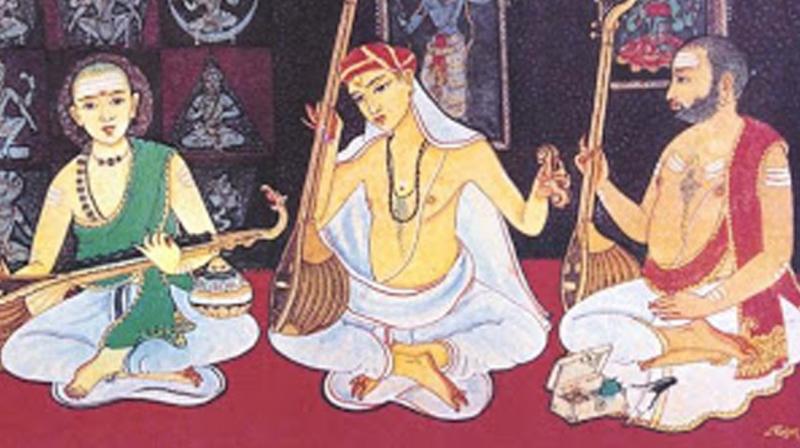Of art and music: Unravelling lyrical excellence of Dikshitar compositions
Muthuswami Dikshitar scaled new heights in the harmony of sangeetha and sahitya.

Muthuswami Dikshitar scaled new heights in the harmony of sangeetha and sahitya and their many dimensional beauties. On the other hand, Thyagaraja was a great river, into which the noblest tradition of music-bakthi and renunciation-flowed, and Syma Sastri had a rhythmical frame of mind and was always swimming in the eternal regions of rhythms and thala prasthara. There is no doubt that a new chapter in the history of South Indian music was written by the musical trinity, in whose hands, sangeetha kavitha (music creativity) reached the acme of perfection.
It was an educative programme organized by Dr Asha, a doctorate holder in Sanskrit and a dancer of merit. She is also a senior disciple of Vidushies Seetha Narayanan and Kalpagam Swaminathan, who released a book titled 'Concepts, Contexts and Conflations, in the kritis of Muthuswami Dikshitar. When we go through the book, which comprehensively delves into the depths of lyrical excellence of Dikshitar and his eternally vibrant classics highlighting their philosophic, mystic and cultural love, we are spellbound. We cannot but admire the sadhana of Dr Asha, for her illuminating coverage of philosophy of advaita, srividhya, mystic significance of deities and lyrical excellence, revealing how with advaitas the focal point, Dikshitar was able to harmonise various traditions and achieve a perfect blend of melody and mysticism.
Basically, this book is a conceptual study, detailing the depth and subtleties of advaitic content in Dikshtar's compositions and revels how seamlessly it harmonizes with various other traditions. The coverage, relating to the experience of the supreme, in Dikshita's kritis is like the glorious, rich variegated plumage of a peacock. The deities of sanmata (viz) Ganapath, Siva, Vishnu and others, are dealt with extensively in the kritis.
It is certainly an illuminating and innovative production, and an enlightening work that brings out the importance of the Sricakarpuja, the devi upasana and the importance of astronomy and astrology. It reveals the scholarship and total involvement of the author. This is an important book that would interest music buffs and enable them to get a clear view of the need for practice of nadopasana, for elevating oneself to lead a life of morality, righteousness and for understanding the profundity of Sri Muthuswami Dikshitar, to whom this production is dedicated.
(The writer is a well known music critic who has won awards both in India and abroad for propagation of classical arts and music)

